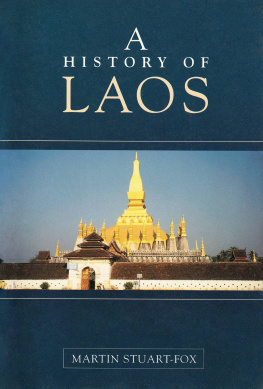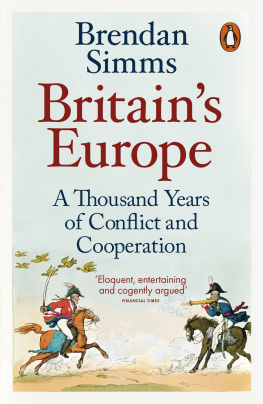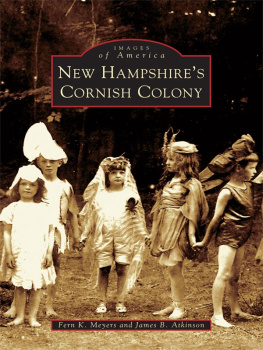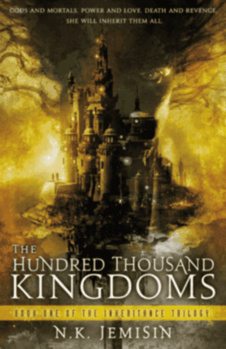To TIAO INKHAM RANGSI
First published in 1999
by Curzon Press
Richmond, Surrey
http://www.curzonpress.co.uk
1999 Peter and Sanda Simms
First paperback edition published 2001
Typeset in Baskerville by LaserScript Ltd, Mitcham, Surrey
Printed and bound in Great Britain by
Biddies Ltd, Guildford and King's Lynn
All rights reserved. No part of this book may be reprinted or reproduced or utilised
in any form or by any electronic, mechanical, or other means, now known or
hereafter invented, including photocopying and recording, or in any information
storage or retrieval system, without permission in writing from the publishers.
British Library Cataloguing in Publication Data
A catalogue record of this book is available from the British Library
Library of Congress Cataloguing in Publication Data
A catalogue record for this book has been requested
ISBN 0-7007-1531-2
FEW COUNTRIES CAN compete in remoteness and romance with the faraway land of Laos, once one of the three kingdoms of Indochina, with Vietnam and Cambodia. French administrators who served long in Laos were said to have succumbed to a certain dreamy, live-and-let-live attitude that made them suspect in the colonial service. Impoverished, and fervently Buddhist, Laos suddenly found itself in the Cold War cockpit in the late 1950s and early 1960s when East and West vied to fill the vacuum left by the departing French.
The outgoing President Eisenhower told the incoming John Kennedy that Laos was the hot-spot that was going to cause him the most trouble in the new administration. Kennedy, who never learned to pronounce Laos properly (he rhymed it with chaos instead of house), went on national television with maps and charts to describe the West's alleged vital interests there and the all but incomprehensible politics that pitted princes and their various political factions against each other. Kennedy tried to piece together a coalition of Lao forces and a withdrawal of foreign advisers an agreement which nobody kept. There followed a tragic clandestine war as the United States tried to organize resistance to the Vietnamese and Lao Communists who needed eastern Laos for the Ho Chi Minh Trail to transport men and material down into the maelstrom of the Vietnam War.
Both the Americans and the North Vietnamese used their proxies in Laos to fight a shadow war, while the number of bombs dropped on the tiny country rivalled all the bombs dropped in World War II. Seven months after the fall of Saigon, Laos was taken over by the Communists, who abolished the monarchy and sent the former, pro-Western elite, including the King, into re-education camps from which many never returned.
There have been many books about the tragedy of modern Laos, but little has been written about the ancient origins of the people who infiltrated south from China into the mountains and valleys of what are now Laos, Thailand, Northern Burma and Assam half a millennium ago. Theirs is a fascinating story of conquests and defeats as kingdoms came and went, of a time when white elephants could be a casus belli as rich and colourful a canvas as historians have ever painted upon.
Peter and Sanda Simms have filled this gap with verve in this detailed history of Laos from the beginning of the 14th century until the coming of the French a hundred years ago. They have woven memoirs and travellers' tales with scholarly translations from ancient texts.
Peter Simms, an Englishman who began his east-of-Suez life in World War II India with the Bombay Sappers and Miners, was studying Sanskrit at Cambridge when he met his future wife, who was reading anthropology there. Sanda is a princess from the Shan States in Northern Burma. Her father was the first President of the independent Union of Burma after the British left, but was overthrown in a coup which led to decades of evermore repressive army rule, which exists to this day.
Sanda went on to an academic year at the School of Oriental and African Studies in the University of London, and then joined Peter in Bangkok where they were married. In the mid-fifties they spent six months walking over north Laos in that last period before war overcame the region. After a stint in Rangoon, which became impossible for them after the coup, the Simmses ended up at the University in British Guyana where Peter wrote his well-received political analysis, Trouble in Guyana.
The lure of the East was too strong, however, and the Simmses ended up back in Laos in the mid 1960s, when they took up newspapering. Peter was hired by Time Magazine in Laos and was later sent to Singapore and then Bangkok as the Vietnam War escalated. It was in Bangkok, where I was sent by Time in 1969, that I got to know the Simmses. Sanda was beautiful, soft-spoken and aristocratic. Peter, in those days, was a Conradian expatriate an old Far East hand who already knew more about the Orient than I would ever know. It was no surprise to me that Peter later served as the model for John le Carr's The Honourable Schoolboy.
Peter gave up journalism to join the intelligence branch of the Hong Kong police, and later served the Sultan of Oman. But with this important, well-researched and fascinating book, the Simmses have returned to that magic place which they were fortunate enough to have known in that twilight time when the old Laos was about to disappear forever.
H.D.S. Greenway, Needham, Massachusetts
WE HAVE WRITTEN this history as a tribute to a great nation. One that at the moment is severely divided, but hardly more severely than on a number of other occasions in the past. It was while we were writing an account of the evens between 1945 and 1975, many of which we experienced at first-hand, we came to realise that, however terrible they were, many of the events we were recording had happened before, and yet Laos and the Lao people have survived. Wc hope this book will be a tribute to the greatness of the Lao and that one day we shall all see the emergence once again of the kingdom of Laos as an independent and united nation.
Another reason for writing this book has been the remark, so often made to us by our Lao friends in exile, that there was no general history book on Laos they could give to their children to help them understand the country that was their birthright.
This is in no way to under-estimate the great achievements of Maha Sila Viravong and ML Manich Jumsai who have done so much to bring to light the Annals and many other historic writings to be found in the libraries around the world, especially in Bangkok. Their work is highly notable. We also wish to refer the reader to some of the great works of Charles Archaimbault, of Henri Deydier, Pierre Bernard Lafont, Paul Le Boulanger and other French scholars. Among the modern Lao scholars we must mention Saveng Phinith, whose translation of the Annals of Luang Prabang we relied on so heavily. He is one of the many Lao historians who are currently working in the field of Lao studies. There is also a modern school of western historians in Australia with Stuart Fox who have made original contributions towards the unlocking of the past. We are particularly indebted to Stuart Fox's thoughts on the times of the Mahadevi.













